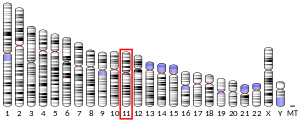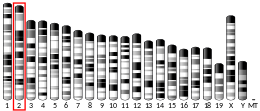HSD17B12
Estradiol 17-beta-dehydrogenase 12 is an enzyme that in humans is encoded by the HSD17B12 gene.[5][6][7]
The enzyme 17-beta hydroxysteroid dehydrogenase-12 (HSD17B12) uses NADPH to reduce 3-ketoacyl-CoA to 3-hydroxyacyl-CoA during the second step of fatty acid elongation.[supplied by OMIM][7]
References
- 1 2 3 GRCh38: Ensembl release 89: ENSG00000149084 - Ensembl, May 2017
- 1 2 3 GRCm38: Ensembl release 89: ENSMUSG00000027195 - Ensembl, May 2017
- ↑ "Human PubMed Reference:".
- ↑ "Mouse PubMed Reference:".
- ↑ Moon YA, Horton JD (Feb 2003). "Identification of two mammalian reductases involved in the two-carbon fatty acyl elongation cascade". J Biol Chem. 278 (9): 7335–43. doi:10.1074/jbc.M211684200. PMID 12482854.
- ↑ Persson B, Kallberg Y, Bray JE, Bruford E, Dellaporta SL, Favia AD, Duarte RG, Jornvall H, Kavanagh KL, Kedishvili N, Kisiela M, Maser E, Mindnich R, Orchard S, Penning TM, Thornton JM, Adamski J, Oppermann U (Feb 2009). "The SDR (short-chain dehydrogenase/reductase and related enzymes) nomenclature initiative". Chem Biol Interact. 178 (1–3): 94–8. doi:10.1016/j.cbi.2008.10.040. PMC 2896744. PMID 19027726.
- 1 2 "Entrez Gene: HSD17B12 hydroxysteroid (17-beta) dehydrogenase 12".
Further reading
- Maruyama K, Sugano S (1994). "Oligo-capping: a simple method to replace the cap structure of eukaryotic mRNAs with oligoribonucleotides". Gene. 138 (1–2): 171–4. doi:10.1016/0378-1119(94)90802-8. PMID 8125298.
- Suzuki Y, Yoshitomo-Nakagawa K, Maruyama K, et al. (1997). "Construction and characterization of a full length-enriched and a 5'-end-enriched cDNA library". Gene. 200 (1–2): 149–56. doi:10.1016/S0378-1119(97)00411-3. PMID 9373149.
- Strausberg RL, Feingold EA, Grouse LH, et al. (2003). "Generation and initial analysis of more than 15,000 full-length human and mouse cDNA sequences". Proc. Natl. Acad. Sci. U.S.A. 99 (26): 16899–903. doi:10.1073/pnas.242603899. PMC 139241. PMID 12477932.
- Ota T, Suzuki Y, Nishikawa T, et al. (2004). "Complete sequencing and characterization of 21,243 full-length human cDNAs". Nat. Genet. 36 (1): 40–5. doi:10.1038/ng1285. PMID 14702039.
- Suzuki Y, Yamashita R, Shirota M, et al. (2004). "Sequence comparison of human and mouse genes reveals a homologous block structure in the promoter regions". Genome Res. 14 (9): 1711–8. doi:10.1101/gr.2435604. PMC 515316. PMID 15342556.
- Gerhard DS, Wagner L, Feingold EA, et al. (2004). "The status, quality, and expansion of the NIH full-length cDNA project: the Mammalian Gene Collection (MGC)". Genome Res. 14 (10B): 2121–7. doi:10.1101/gr.2596504. PMC 528928. PMID 15489334.
- Gnatenko DV, Cupit LD, Huang EC, et al. (2005). "Platelets express steroidogenic 17beta-hydroxysteroid dehydrogenases. Distinct profiles predict the essential thrombocythemic phenotype". Thromb. Haemost. 94 (2): 412–21. doi:10.1267/THRO05020412. PMID 16113833.
- Luu-The V, Tremblay P, Labrie F (2006). "Characterization of type 12 17beta-hydroxysteroid dehydrogenase, an isoform of type 3 17beta-hydroxysteroid dehydrogenase responsible for estradiol formation in women". Mol. Endocrinol. 20 (2): 437–43. doi:10.1210/me.2005-0058. PMID 16166196.
- Sakurai N, Miki Y, Suzuki T, et al. (2006). "Systemic distribution and tissue localizations of human 17beta-hydroxysteroid dehydrogenase type 12". J. Steroid Biochem. Mol. Biol. 99 (4–5): 174–81. doi:10.1016/j.jsbmb.2006.01.010. PMID 16621523.
This article is issued from
Wikipedia.
The text is licensed under Creative Commons - Attribution - Sharealike.
Additional terms may apply for the media files.




